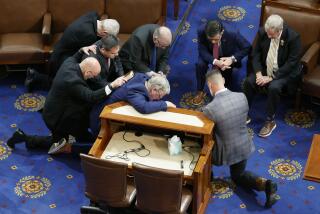Distractions Mask Congress’ Unhurried Pace
With the public’s eye trained on the campaign for president, hostilities in the Middle East and the Subway Series in New York, scant attention is being paid to the extraordinary way Congress is ending this year’s session:
Very, very slowly.
More than two weeks past its scheduled adjournment date, Congress this week still faces a panoply of major issues, including funding for schools and teachers, immigration policy and a minimum-wage increase, that must be addressed before it can adjourn and send members home to campaign for reelection.
But even with election day around the corner, Capitol Hill is oddly bereft of the fast-paced deal-making--the late-night negotiations, the weekend sessions, the urgent frenzy--that usually bring a legislative year to a close.
Instead, top congressional negotiators in recent days have haggled haltingly over the details of the year-end budget. The rest of Congress has been meeting only two or three days a week. The latest deadline for adjournment is Wednesday. But that goal, like a mirage, may vanish.
This Congress, in short, has turned the traditional rush to adjournment into a stroll.
Democrats point to the delayed departure as Exhibit A in their argument that Republicans do not deserve to keep their majority in Congress because they have not gotten their work done on time.
“It’s a combination of ‘West Wing’ and ‘Seinfeld,’ ” said Senate Minority Leader Tom Daschle (D-S.D.). “We meet once a week, but nothing happens.”
The unusually languid pace on Capitol Hill these days is the result of a confluence of factors:
* The budget talks are being drawn out, in part, because Republicans are mounting a last-ditch effort to hang tough in negotiations that President Clinton so far has dominated.
* The rank-and-file is not in an uproar about going home to campaign because, in fact, only a few dozen have serious challenges. And those members have been able to spend long weekends at home because of Congress’ short workweek.
* Tragedies around the world have disrupted the congressional routine. Congress suspended business so lawmakers could attend memorial services for Rep. Bruce F. Vento (D-Minn.), who died of cancer; Democratic Missouri Gov. Mel Carnahan, who died in a plane crash; and the victims of the bombing of the U.S. guided missile destroyer Cole.
* Lawmakers feel little heat from the public because it seems hardly anyone is paying attention. The issues dividing Clinton and Congress are relatively minor, especially compared to the large-scale issues at stake in the presidential campaign and the Middle East crisis. And this legislative session certainly lacks the rare thrill of seeing two New York teams battling it out in the World Series.
“Congress is an afterthought,” said Rep. Thomas M. Davis (R-Va.), chairman of the GOP campaign committee. “Nobody knows or cares.”
But in the absence of public scrutiny, Congress is not only dragging its feet. It is also loading its year-end appropriations bills with pork-barrel spending that critics say is unparalleled in its scope and audacity.
“With the national spotlight focusing on the presidential race, Congress has felt free to spend taxpayer dollars with abandon,” said Eric V. Schlecht, director of congressional relations for the National Taxpayers Union.
Congress initially had planned to adjourn Oct. 6 to leave plenty of time to campaign before election day, when control of Congress as well as the White House is up for grabs. But by then, Congress had enacted only two of the 13 appropriation bills needed to keep the government running after the fiscal year began Oct. 1. All month, the government has been operating on a series of short-term funding bills, the latest of which expires at midnight Wednesday.
After that, Clinton has said he will sign only one-day extensions of funding to keep the pressure on congressional negotiators to wrap up by the end of the week. And he complains that Republicans are being stingy with some of his priorities while fattening bills with home-state projects.
“We are going to have to go on a day-to-day basis,” John Podesta, White House chief of staff, said Sunday on CNN’s “Late Edition.” “It’s time now they sit down with us and address critical needs.”
Republicans blame Democrats for the delays, accusing them of foot-dragging and obstructionism all year so they could campaign against a “do-nothing” Republican Congress. And they blame Democrats and Clinton for the run-up in spending.
“Their drive to become the majority party was predicated on a do-nothing strategy that was designed to stop anything from happening,’ House Majority Whip Tom DeLay (R-Texas) said.
Some Republicans have given top priority to getting out of town as soon as possible, even if it means making concessions to Clinton, as they already have on environmental protection, housing and other programs. But DeLay and others are arguing for a tougher negotiating posture, saying it is more important to get a good deal than a quick one that disheartens Republicans’ core supporters. Many Republicans believe that one reason they lost five House seats in the 1998 elections is because of GOP voters’ frustration with a year-end budget deal they believed gave too much to Clinton.
“We learned in 1998 that paying tribute to ‘go home early’ doesn’t help you,” said Davis, the GOP campaign chairman. “We’ll stay as long as it takes to make sure we get a good deal for the American people.”
*
Among the issues that remain to be resolved before Congress adjourns are:
* Education. Clinton wants $3.1 billion for his signature education initiatives in teacher hiring and school repairs, and an additional $2.4 billion in tax credits to subsidize school construction bonds. Republicans want to spend nearly the same amount as Clinton for education and other social programs, but they want to give states and school boards more leeway in how they spend federal education aid.
* Immigration. Democrats are demanding inclusion, as part of a bill financing the Department of Justice, of a measure to grant amnesty to hundreds of thousands of illegal immigrants who are long-time U.S. residents. Republicans are divided over the issue, which is a high priority among Latinos.
* Abortion. Negotiators appear to be narrowing differences over GOP efforts to ban U.S. aid to overseas family planning groups that perform or promote abortion. One possible compromise would provide an increase in international family planning aid, but it would make the money available only after the next president is sworn in, freeing him to decide whether to impose the abortion restrictions.
* Health care. Republicans plan action on a bill that would restore $28 billion in Medicare funding that had previously been cut from payments to hospitals, health maintenance organizations and other health care providers. But Clinton has threatened to veto the bill because it gives too large a share to HMOs.
* Minimum wage. Leaders of both parties expect Congress to approve a measure to increase the federally mandated minimum wage $1 over two years--from $5.15 to $6.15. It is expected to be included in a package of tax cuts, but details of the tax measures remain in flux.
* Tax cuts. Although Clinton has vetoed GOP efforts to make big cuts in taxes on inheritances and on married couples, Republicans are preparing a much smaller tax-cut package they hope Clinton will sign. It is expected to include an increase in the amount of money people can put each year in individual retirement accounts. It also will give tax breaks for small businesses and encourage urban and community development in poor areas.
*
Times staff writer Nick Anderson contributed to this story.
More to Read
Get the L.A. Times Politics newsletter
Deeply reported insights into legislation, politics and policy from Sacramento, Washington and beyond. In your inbox three times per week.
You may occasionally receive promotional content from the Los Angeles Times.







